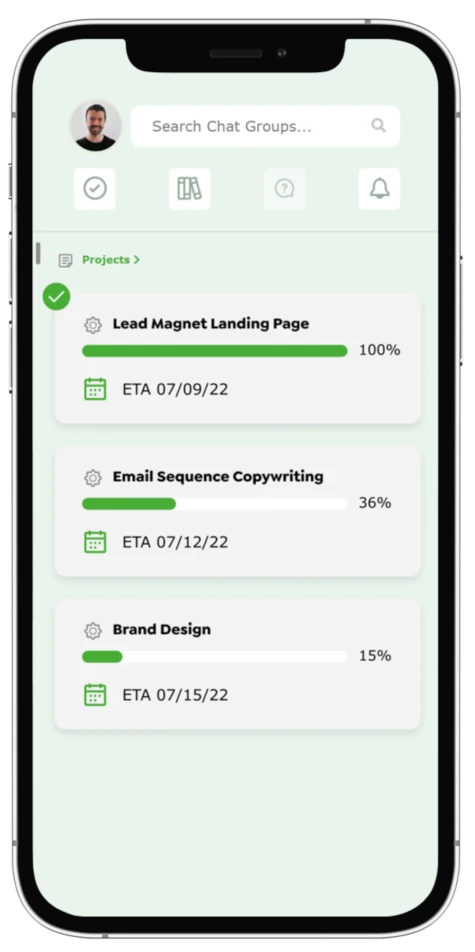Do You Monitor Your Online Reputation? These Red Flags Could Be Costing You Sales

Let’s take a trip back in time.
It’s 1996, and I want to buy a new pair of combat boots.
What do I do?
Ask my friends where they got theirs. Order a catalog. Actually go into a store.
Options were limited.
Flash forward 20 years, and I can Google “combat boots” and instantly get back hundreds of results.
Even better – I can check out websites, view images, and read reviews.
So, what does that have to do with this article?
There are people out there right now searching online for your business.
Lots of them.
Do you know what they’re finding? Do you even monitor your online presence?
You should.
It’s important to know what turns up, because it can influence whether people do business with you or not.
In this article, I’ll tell you everything you need to know about online reputation, how to monitor yours, and what to do when it goes wrong.
Let’s get started with the basics.
What is Online Reputation? (Hint: It’s Not Just Reviews and Testimonials!)
Think that “online reputation” means “online reviews”?
You’re wrong.
Online reputation is so much more than that!
It’s the sum of your online presence.
It’s the content you share.
It’s what other people say about you, and what you say about them.
It’s your social media presence and your website.
And, yes, it’s a little bit reviews and testimonials.
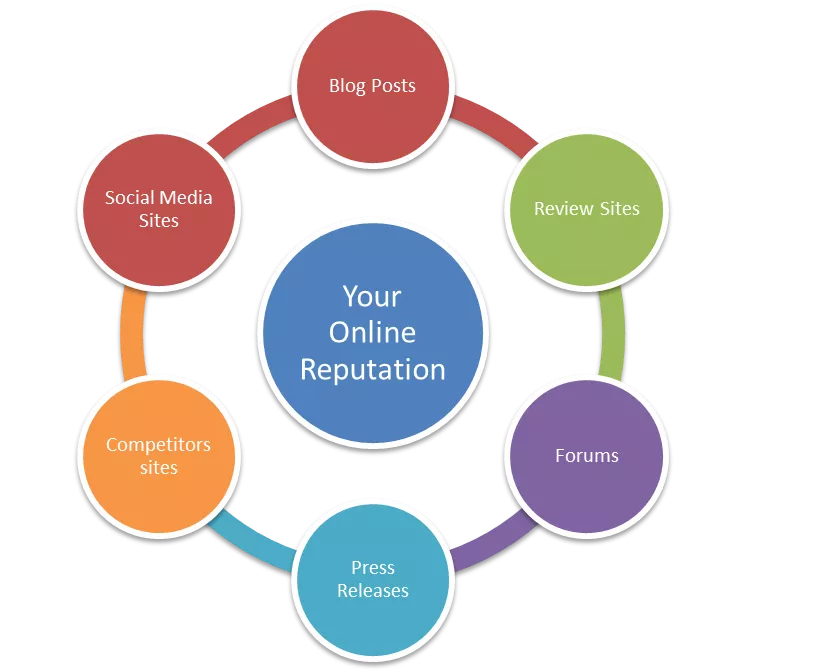
It’s everything. And it can make or break you.
To be blunt: if your online reputation sucks, no one is going to do business with you. Period.
Consider Amazon. If you’ve ever purchased anything on the site, it’s likely that you checked out the product reviews first.
Perhaps you moved beyond that. Many people will read the Q&A to see how they’ve responded to customer questions. Some people will even go check out their actual webpage.
I know that I’ve personally checked the Q&A – and I’ve passed on a product when I see that the manufacturer has given half-assed answers (or none at all).
These days, business owners know what’s up. They’re vigilant of what’s being said about them online, and they understand the importance of interacting with their audience.
In fact, a survey earlier this year from Clutch.com found that digital marketers plan to allocate more resources to online reputation management to boost business success.
You should, too.
Why You Should Monitor Your Online Reputation
If you’ve recently gone to a networking event or handed someone a business card, you should assume that you’re being Googled.
In fact, no matter what is going on in your business, you should assume that you are being Googled.
Someone somewhere is probably Googling you right at this very moment.
And all it takes is one little error, one tiny slipup on your part, for everything to fall apart.
Not only is that random internet user never going to do business with you, but they’re going to make sure none of their friends ever do business with you, either.
That’s the power of the internet. One simple online search can quickly turn up a plethora of information on your brand.
And if people are saying bad things about you and your company, do you think prospective customers are going to dig deeper? Do you think they’ll bother to do further research?
Likely not. Because there are dozens of other people out there doing exactly the same thing that you do.
Here are some other reasons you should monitor online reputation:
- Build credibility:
There is nothing more important than customer trust. Beyond testimonials and reviews, there are dozens of things you can do to help build that relationship.
If you want to create confidence in your brand, share valuable content. Provide great customer service. Be honest about what you can do. And, yes, address negative reviews quickly and fairly.
- Build a brand image:
Constantly monitoring responses to communications and what’s being said about you online can help create the image you want.
Every time you post something to social media or share a blog post, you can see how your audience feels about them. They TELL you how they feel about them.
Just watch the comments!
… Then use that information to tailor your approach and give them what they need.
- Increase sales:
It’s 2018. Where do you think people go when they want to buy something?
We’ve already gone over this. You know the answer. THEY GO ONLINE.
If you want the countless people on the internet to buy from you, you better make damn sure that your reputation is in order.
An active social media presence, professional website, and good reviews can all go a very long way towards converting leads and making new sales.
Want to Know What People Are Saying About You? Use These Tools.
Monitoring your online reputation is as easy as 1, 2, 3. Or as easy as hiring an Online Reputation Management (ORM) firm.
Potato, potahto.
If you’re not quite ready to hire someone yet, there are lots of other (read: cheaper) options out there.
- Google Alerts:
If you’ve done any marketing, chances are you already familiar with Google Alerts and how to use it.
If not, simply log in, type your company name in the search bar, and presto! You can see all the recent news about your brand.
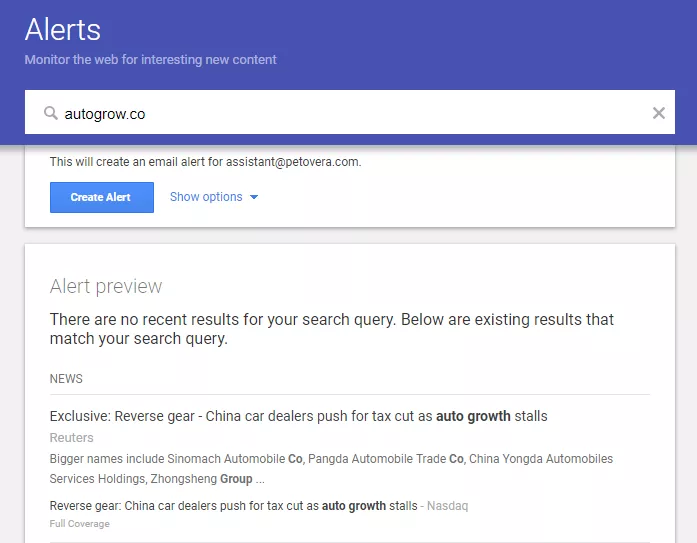
Hit the “create alert” button to get emails every time someone mentions you on the web. You can set them for as they happen, once a day, or once a week.
- Social Mention:
This free tool monitors 80 websites for mentions of your company name, including Facebook, Twitter and YouTube.
The results display how often your specific term is mentioned, what the sentiments are, top keywords, and more.
Better yet – it’s free.
Here’s a search I did using the phrase “sales funnel”:
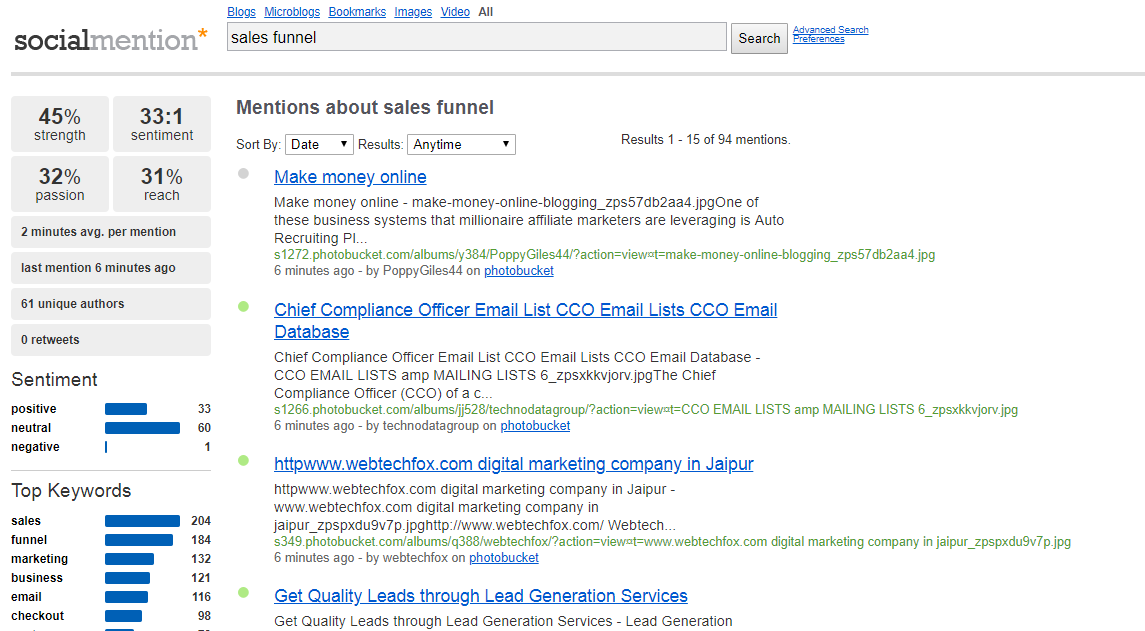
The Brand Grader:
This tool is a bit different. It works in the same manner: you plug in your company name, and they spit out a report.
But the report itself contains some unique information.
Included are:
Influencers who are talking about you online
Top sources (are people talking about you on Facebook? Twitter?)
Whether people are talking about you positively or negatively
Where people are talking about you (London? Chicago? Asgard?)
The only issue is, it’s sort of hit or miss.
Check out the screenshot below. That Reddit thread right up top didn’t even mention us.
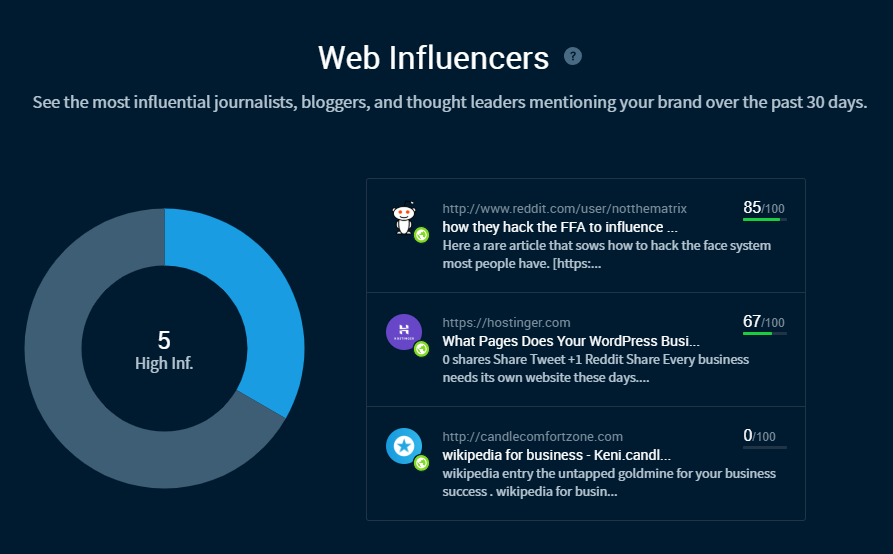
- Trackur
This one is a pay service – but they do call themselves the “broadest social media monitoring tool out there.” That sounds like something worth paying for.
Trackur fully monitors social media and mainstream news, provides social analytics, and offers keyword insights (amongst other things).
This is what the dashboard looks like when you search “Facebook”:
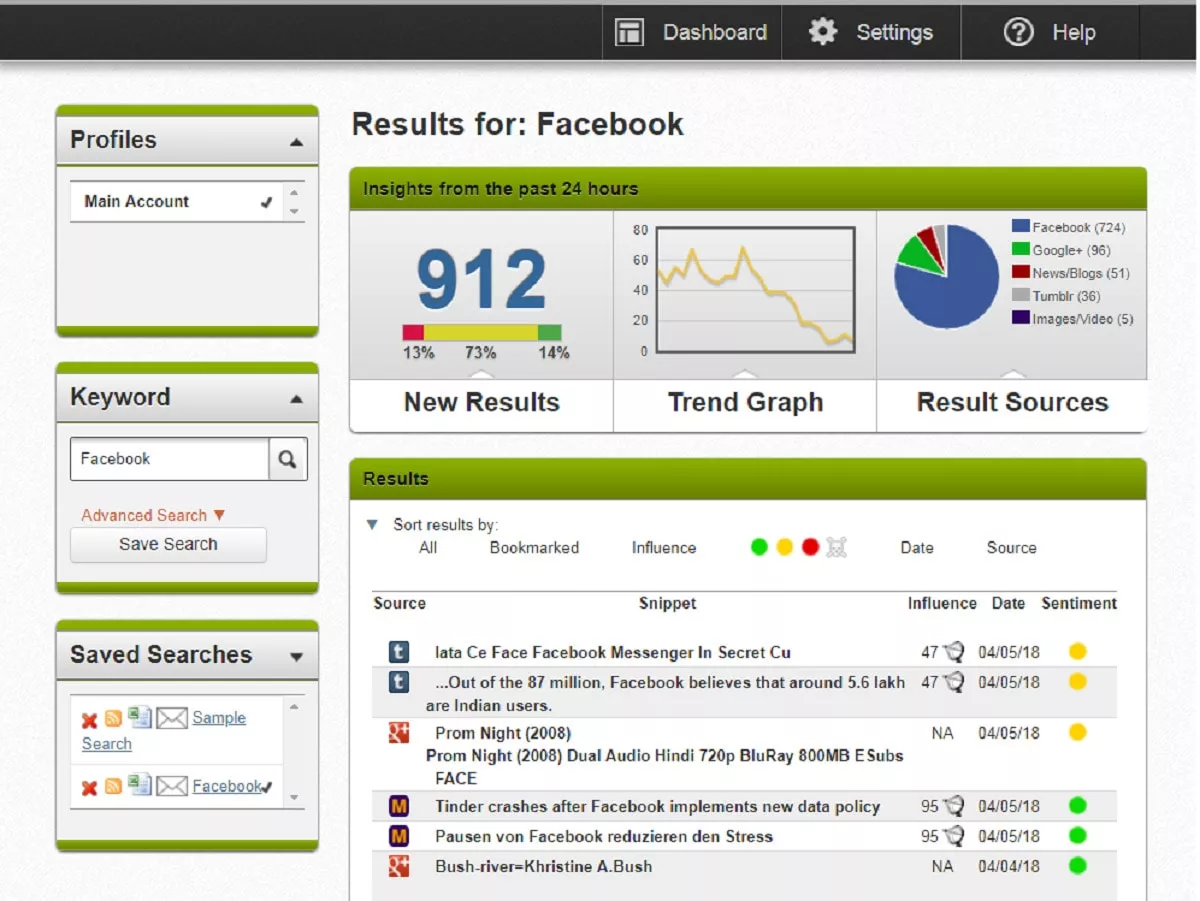
If none of these tools really does it for you, there are literally dozens of other options. A quick Google search for Online Reputation Management will yield plenty of results.
Watch Out For These Red Flags – They Might Be Costing You Sales
Today, buyers from all walks of life use online content to inform purchasing decisions. And if your brand has any of these red flags, they may choose to do business with someone else.
- Negative search results
You know what they say – the first impression is the last impression.
And on the internet, you have mere seconds to make that impression.
65% of people today view online search as their most trusted source of information.
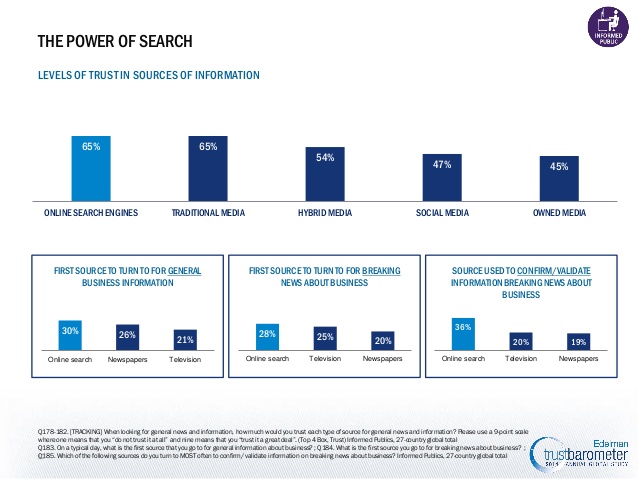
If you have negative search results, you’re losing prospective clients right off the bat – before you’ve ever even had a chance to talk to them.
Simon Wadsworth, managing partner at Igniyte, says:
"When people search for brands online, they tend to search for stamps of credibility. If they find anything negative, that could end up being a significant amount of leads that the business won’t get from people who are put off from using the service."
Unfortunately, negative search results are incredibly common. Nearly 50% of US adults say that when they Google themselves, the results aren’t positive.
It is critical to remember that anything you do or say online is going to stay there forever. Even if it’s on your personal account (and that account is private).

People will use the things you’ve said or done online against you, often completely out of context.
Even worse? Anyone can say anything they want about you.
Disgruntled employees, unhappy customers, and ex-boyfriends can all use the internet to take out their wrath on you.
And, trust me, your prospects don’t care if your drama isn’t business related. They still don’t want to deal with it.
You may be thinking, “well, I get all my business via word-of-mouth, so this doesn’t matter.” And you would be wrong.
Even if their best friend of 30 years recommended you, that prospect is still going to Google you. It’s what people do today.
Just assume that if you have negative search results show up, it’s affecting your bottom line.
- No search results
Fact: Having no online presence might actually be worse than having a bad online presence.
Part of that, of course, is Google rankings.
It pays to rank high. At a minimum, 75% of clicks go to the first page of Google results.
Take a look at the chart below, and you can see that click-through rate is directly tied to ranking results:

If your page isn’t right there up front, most people are never even going to notice you.
But Google is just the tip of the iceberg.
People expect to find you on Facebook and Twitter. They want to see a blog. Maybe they want a case study.
Bottom line:
They want to know that you are an actual, real human being and not just some faceless corporation (or a bot trying to scam them).
Beyond that, having an online presence also:
- Garners a wider audience
- Enhances accessibility
- Helps build trust
- Fosters customer relationships
- Provides a free (or cheap) source of marketing
- Negative reviews
Everyone has a story about that one crazy customer who went batshit crazy and freaked everyone out. We have several.
In the past, those people might have bad-mouthed you to a couple of friends. Maybe they’d write a letter to the editor. (Did anyone actually read those, btw?)
Today, they can go online and say whatever they want about you and your company with little to no repercussion.
Sites like Yelp and Google reviews make it easy for people to share their experiences. Literally anyone can do it.
Unfortunately for business owners, it’s not just a bad reputation that you need to worry about.
Negative reviews also affect your bottom line.
ReviewCamp found that increasing your online ratings by just one star on sites like Yelp or Google Reviews can up your yearly revenue by 9%.
It can be frustrating when your review platform seems to function as a megaphone for dissatisfied customers.
Even if those reviews are in the minority, they can be difficult to overcome. Sadly, people remember negative events more than they remember positive ones.
To help highlight the positive side of your business, do the following:
- Maintain an active presence on social media
- Offer valuable content
- Interact with the audience
- Respond to reviews – both positive and negative
- Fake reviews
We’ve been lucky over here at Autogrow. We really don’t get many negative reviews.
But a few years ago, we had a fake one (likely from a bot) that said this:
Unauthorized credit card charge apparently made because a secret box was checked or unchecked when I made a $1.95 purchase. Don’t do business with this unethical company!
It was signed by a gentleman named Mo Cowper.
First – secret buttons?? What? Is that even a thing?
I’m trying to wrap my head around how you could 1) hide a secret button on a checkout page and 2) trick someone into clicking on that secret button.

Next, we never offered a product for $1.95. We wouldn’t do that.
In fact, Matt’s repeatedly said that no one should ever sell a product for less than $97.
If anyone did any research, they’d realize that review was obviously fake.
Unfortunately, many people don’t bother to do research – no matter how outlandish a review might seem.
Google, and most other review sites, have policies prohibiting people from leaving fake reviews – but they’re difficult to enforce.
Why? Because it’s incredibly hard to prove that a review is fake. When it comes down to it, it’s really a “he-said, she-said” thing.
Google doesn’t know who your customers are, or what kind of business you’ve done with them. And since reviewers are allowed to use anonymous names, it’s near impossible to prove someone’s real identity.
The other problem? A person doesn’t have to be an actual customer to leave a review. They just need to have had a customer experience.
That could be anything from a phone call to an interaction on social media.
And when it comes to social media, forget about it. It’s a free-for-all.
Juda Engelmayer says:
"You can do everything in your power to boost your reputation on standard search engines like Google or Yahoo by building domain names and creating content. Social media, however, is uncontrollable. People can tweet whatever they want, or they can go to Yelp or Facebook to post about a bad experience. This can have a huge effect on search engines."
- Not producing enough content
According to Forbes, 75% of buyers claim they trust a business because of the digital content available online.
In addition, 51% of B2B buyers say they rely more on content to inform their purchasing decisions today than they did a year ago.
What does that mean for you?
If you don’t have enough content (or any content), those buyers:
- Might have a hard time trusting you and
- Will probably go with someone that does have online content
So, what is content?
It’s your website, of course. But it’s also blogs, videos, social media posts, and white papers. It doesn’t even have to be original – it can be someone else’s content that you’re passing along.
It just needs to be useful.
These are some good tricks to keep in mind for creating engaging, informative content:
- Create a style guide. Give it to all your employees. Make sure NOTHING gets posted if it doesn’t meet your guidelines.
- Try out new ideas. Play with your email newsletters, blogs, and tweets, and see what gets the best reaction.
- Don’t put anything out there if it isn’t going to help you reach your goal.
It’s doesn’t matter whether you’re just starting out, or you’re a multimillion-dollar company. Buyers at all levels want to see digital content.
If you have content on the backburner, it may be time to reconsider.
- Lack of employee advocacy
When you own a small business, competition can be fierce.
You not only have other small businesses to contend with, but there are likely several large corporations that will give you a run for your money.
Consider ACE Hardware. Each individual store is owned and operated by a sole proprietor.
Yes, they receive advertising support from the franchise. It’s definitely easier for them to compete with the big guys than someone like you or me.
But they’re still a small business compared to a place like Lowes or Home Depot. And those stores are cheaper to boot.
So why do people love Ace so much?
The employees are fantastic. They’ll give you attention that you can’t get at a big chain store. They’re helpful and kind, and they give the stores that “small town” feel.
Moral of the story? Your employees can be a selling point.
They have a connection with buyers that you, as the owner, do not.
If you’re like most businesses, you spend a lot of money on advertising and getting the word out about your brand.
Don’t forget about your employees in the process. Every single person that works for you has an entire network of other people who care about what they say.
Studies show that brand messages shared by employees on social media get 561% more reach than the same messages shared by the brand itself.
In addition, leads developed through employees’ social media activities covert 7x more frequently than other leads.
When you’re developing your online strategy, remember to involve your best advocates.
- Poor branding
Jeff Bezos said, “A brand for a business is like a reputation for a person.”
A positive brand reputation helps build loyalty and confidence in your product or service. And it’s critical to growing business.
With online conversations taking place 24/7, it’s important for your brand to be prominent and positioned as a knowledgeable, industry-leading resource for your customers.
Here are some ways you can build a strong brand identity:
1. Establish a unique selling proposition. This is marketing 101. It simply means: figure out how your company is different from the others and what value you can offer your customers.
2. Determine your brand’s look, feel, and voice. Do you want to be formal? Conversational? Funny? Smart? Use the same style across all channels for consistency and recognizability
3. Implement strategies to strengthen brand identity. These might include building a social media presence using the appropriate channels, communication directly with the audience, and making sure your website is aligned with brand goals.
Also – ensure your site is user-friendly. It should be neat, easy to navigate, and fast to load. In addition, provide several means of contact to make connecting easy.
4. Constantly update. Your brand strategy should always be a work in progress. Watch what the audience is saying and adjust your message, goals, or marketing materials to meet their needs.
- No personal interaction with your audience
Companies today have the opportunity to converse firsthand with their customers.
In the grand scheme of things, this is a relatively new development.
Facebook first introduced brand pages in 2007 (a little over 10 years ago).

It just snowballed from there. In 2009, they introduced contests and promotions. And in 2010, they rolled out storefronts and ads.
And, of course, there are now dozens of other social networks on the scene. Some of them are even more popular than Facebook.
That means that businesses today have unprecedented access to their audience.
Shannon Wilkinson, CEO at Reputation Communications, a reputation management agency in New York, says:
"Social media enables companies to participate in conversations about their products, services, and industries. It also enables them to monitor those conversations to ensure they can be a part of them."
What that means is: with social media, businesses can react and respond to customer inquiries, complaints, or comments in real time.
They can take part in a personal, one-on-one conversation, without ever even meeting face-to-face.
This sort of interaction makes the customer feel noticed and valued – and it also helps improve online reputation.
When prospects log on to check you out, they want to see that you’re interacting with other people!
How to Repair Your Reputation
If you read through that “red flags” list and immediately broke out in a cold sweat, don’t worry.
Nothing is permanent except for death and taxes, right? In other words – everything is fixable.
Here’s what you can do:
- If your issue is that you have no search results, SEO can help.
Per Moz, there are several advanced techniques that can help squash that bad reputation (without too much effort).
These are a few of their suggestions:
- Use social media wisely
When it comes to social media, don’t spread yourself too thin.
Business owners often try to maintain a presence on every single social media platform out there. This is a mistake.
Rather than amping up your online reputation, it actually dilutes your efforts.
Instead, Moz recommends choosing 2 or 3 of the bigger platforms (like Facebook, Twitter, or Instagram) and concentrating on them.
Another common problem is creating a profile and then never doing anything with it.
Just being on social media isn’t going to do anything for you or your business.
It’s important to share content, interact with the audience, and just generally be active.
Some additional rules to remember include:
- Use your real name, or the name of your business, when creating your profile. It makes it easier for people to find you, plus it helps you appear legit.
- Fill out your profiles completely – photos, bio, contact information, etc.
- Make connections and request a lot of friends/follows. Don’t forget to utilize your address book and request the people you already know.
- Be informative. Share content that your audience will find useful and interesting – just stuff to fill up your page.
- Use the same bio everywhere
Chances are, when you’re featured in the press or appear at events, you have to provide a bio. Heck, you probably even use a bio in your own marketing materials.
It’s useful to come up with a stock bio for the sake of consistency. You want your audience to recognize you as “you” no matter where they find your materials.
That’s just basic branding, right?
Moz recommends peppering the bio with useful links and great anchor text pointing back to pages your control.
- Put yourself out there
I know, public speaking isn’t for everyone. I’ve belonged to a networking group for 6 months now, and I still have a mini-panic attack every time I have to give my pitch.

But speaking at events is a great way to get your name out there.
Whether is an industry conference or a talk at the Rotary Club, your bio and link will be included in their promotional materials. It almost guarantees that you’re going to get fresh eyes and new traffic on your webpage.
- Start an alternative blog
It’s likely you already have at least one blog that’s linked to your main business website.
But have you considered starting a second, related blog?
For example, my main target audience is people that need help writing content for their small businesses. But I’m also a working mom and I talk about that often.
It might make sense to start an entirely separate website and blog dedicated solely to that topic.
Then, I could link between the two and watch the magic happen.
Any chance to gain new audience members is a good chance!
- If your issue is that you have negative search results, try leveraging online reviews
Online review sites are an important resource for businesses trying to build reputation.
Allowing past customers to share their honest opinions is an easy way to build transparency and trust with customers. It comes off as genuine and tends to carry a lot more weight than a traditional sales pitch.
In fact, 84% of people say they trust online reviews as much as they’d trust a friend.

So, what’s the best way to get positive feedback from users who have had an exceptional experience with your product or service?
Just ask!
According to the folks over at Marketing Land, the best way to do it is face-to-face. For those of us with an online business, though, that can be tricky.
Personally, I have clients across the country – many of whom I’ve never met face-to-face.
In that sort of situation, it’s ok to ask for a review via email – as long as you do it the right way.
Here are some tips:
- Make sure the email comes from an actual person’s name (NOT the business name)
- Have the email written as a personal request from that same person
- Include a very clear call-to-action button so it’s easy for the recipient to link to the review site
- If your issue is negative reviews, try a quick and honest response
The problem with allowing customers to review your products and services is that … well, they’re not always going to be good.
That’s ok. That’s why people like reviews so much. They’re unbiased.
I know it can feel like the end of the world when someone says something bad about you or your business, but trust me – it’s not.
When you see a negative review, don’t freak out. Take a step back, do some deep breathing exercises and calm down.
Consider what prospects will see when they happen across that review in the future.
Will they see you getting angry and arguing with a past customer? Or will they see an apology, an explanation, and an offer to make things right?

Bonus tip: share negative reviews with your audience just like you’d share positive ones.
They’ll love to hear about how you remedied the situation.
Blue Kite Marketing says,
"Admitting mistakes can show powerful, courageous leadership. And, it can even boost faith in your organization."
Plus, it’ll get people talking. Everyone has an embarrassing story tucked away about that one time they really messed things up.
It makes for fun conversation.
- If your issue is fake reviews, you can try to have them removed
Unfortunately, not every review you receive is authentic.
Sometimes bots will spam your site with fake assessments, sometimes it’s that ex with a vendetta. Either way, you want to get rid of those.
When you suspect a fake review, the first thing you should do is ascertain the validity. What I mean is, go back through your records and see if you can find that person.
Some indicators that the review is fake are:
- You can’t find the reviewers name in your records
- The date of purchase or purchased items doesn’t match their complaint
- There are no customer service calls or emails on records
- A glaring lack of detail (just a general “this company sucks” rather than “I bought xx and it didn’t work/broke right away/didn’t do what they said it would do”)
Once you’ve determined that the review is fake, you can take steps to have it removed. Usually, this requires jumping through a couple of hoops.
While each site has its own regulations and guidelines that you should look up, in this article, I’m going to concentrate on Google.
Google allows you to report reviews if they violate any of the following policies:
- Spam and fake content – a review should reflect a genuine interaction and not just exist to manipulate rankings
- Off-topic – a review should only mention a product or service and not political, personal, or social topics
- Restricted content – This includes, but is not limited to: alcohol, gambling, tobacco, guns, health & medical devices, adult services, etc.
- Illegal content – images of rape, sexual abuse, terrorist activity, human trafficking, etc.
- Sexually explicit content – pretty self-explanatory!
- Offensive content – content that includes profane, obscene, or offensive language
- Dangerous and derogatory content – threatens or advocates harm, incites hatred, intimidates or bullies others, etc.
Google Maps is the easiest way to flag fake reviews on the platform. Simply find your business listing and click on reviews. Report anything suspicious by clicking on the 3 dots and selecting “flag as inappropriate.”
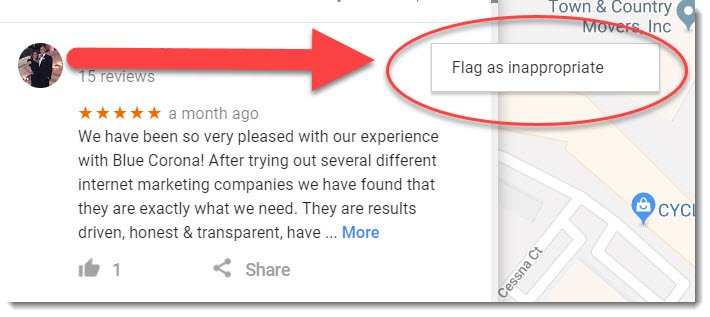
Follow that up by contacting Google directly and asking them to remove the review. It may take several attempts, but it should happen.
- If your issue is that you just don’t know what people are saying about you, try social listening
If you don’t know what people are saying about you, it’s difficult to determine what you need to do.
Earlier in this article, I detailed some social media monitoring tools. And while those are useful, social listening goes beyond just watching your reputation.
It’s important to not get the two mixed up, because they really serve completely different functions.
Social monitoring is about discovering things that have already happened and responding to them as needed.
Social listening is about extracting key insights from social conversations and applying them to your overall brand strategy.
To put it another way: social monitoring treats the symptoms, while social listening treats the underlying disease.

Social listening is a detailed analysis of your audience and what they care about.
It goes beyond metrics like engagement rate and likes, and uncovers a broader picture of the overall social landscape.
How? It includes “sentiment analysis” – tools that tell you whether the talk about you is positive or negative.
It can be exciting to find out that you had 4,000 mentions on Facebook last week. But that information isn’t really useful if you don’t know the feeling behind those mentions.
It’s really not useful if most of those mentions were negative.
When you know the emotions behind posts, it allows you to alter your strategy to more fully meet your customers’ needs.
- When in doubt, hire a PR agency
Sometimes you just need outside help. There’s no shame in that game.
Business owners are busy. We each wear a dozen different hats and it’s impossible to excel at everything.
But when it comes to your reputation, you really can’t risk mediocrity. That’s why sometimes it just pays to hire someone to handle it for you.
Public relations companies offer a level of expertise that most people can’t get using free online tools.
Andy Beal, the “Original Online Reputation Expert” at Reputation Refinery, says:
"It comes down to expertise. External agencies are experts in knowing where to look, helping you understand who your influencers are, which channels to focus on, what keywords to monitor, and what types of sentiment to look for."
PR experts know when and how to communicate the appropriate information in a way that builds trust and expertise. By working with them, you will learn how to do the same.
Final Thoughts
PS - The writing of this article inspired me to actually go out and buy a new pair of boots. And by “go out”, I mean “log onto Amazon”.



